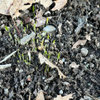UMass Extension Landscape Message June 28, 2013
claireplymouth z6b coastal MA
10 years ago
Related Stories

EVENTSMy Houzz: They’re Right at Home in Their Schindler House
Chance brought a couple to their Inglewood home designed by the L.A. midcentury architect. It will be part of a June design tour
Full Story
STANDARD MEASUREMENTSThe Right Dimensions for Your Porch
Depth, width, proportion and detailing all contribute to the comfort and functionality of this transitional space
Full Story
CURB APPEAL7 Ways to Create a Neighborly Front Yard
Foster community spirit by setting up your front porch, paths and yard for social interaction
Full Story
DISASTER PREP & RECOVERYFamily’s New Style Rises in the Aftermath of a Flood
After their damaged walls are demolished, homeowners realize they like the open space and decide to keep it
Full Story
DECORATING GUIDES10 Design Tips Learned From the Worst Advice Ever
If these Houzzers’ tales don’t bolster the courage of your design convictions, nothing will
Full Story
GARDENING FOR BUTTERFLIES3 Ways Native Plants Make Gardening So Much Better
You probably know about the lower maintenance. But native plants' other benefits go far beyond a little less watering and weeding
Full Story
GARDENING GUIDES6 Plants That Beat Butterfly Bush for the Wildlife Draw
It's invasive, a nonnative and a poor insect magnet. Check out these better alternatives to butterfly bush in the garden
Full Story
LIFECreate a 'Forever House' Connection
Making beautiful memories and embracing your space can help you feel happy in your home — even if you know you'll move one day
Full Story
MOVING5 Risks in Buying a Short-Sale Home — and How to Handle Them
Don’t let the lure of a great deal blind you to the hidden costs and issues in snagging a short-sale property
Full Story
REMODELING GUIDESShould You Remodel or Just Move?
If you're waffling whether 'tis better to work with what you've got or start fresh somewhere else, this architect's insight can help
Full Story







siennact
Related Professionals
Norton Shores Landscape Architects & Landscape Designers · South Elgin Landscape Architects & Landscape Designers · Glendale Heights Landscape Contractors · Kearny Landscape Contractors · Laguna Hills Landscape Contractors · Lakewood Landscape Contractors · Lemay Landscape Contractors · Lemoore Landscape Contractors · North Ridgeville Landscape Contractors · Plymouth Landscape Contractors · Tewksbury Landscape Contractors · Vacaville Landscape Contractors · Ashland Decks, Patios & Outdoor Enclosures · Columbia Decks, Patios & Outdoor Enclosures · Miami Decks, Patios & Outdoor Enclosures